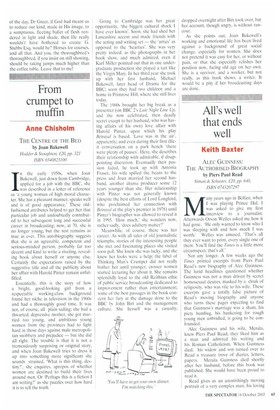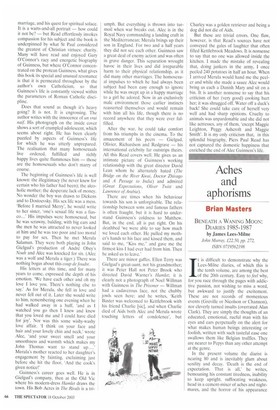All's well that ends well
Keith Baxter
ALEC GUINNESS: THE AUTHORISED BIOGRAPHY by Piers Paul Read Simon & Schuster, £20, pp. 640, ISBN 0743207297 many years ago in Belfast, when I was playing Prince Hal, I was asked to give my first interview to a journalist. Afterwards Orson Welles asked me how it had gone. 'He only wanted to know who I was sleeping with and how much I was worth.' Welles was amused. 'That's all they ever want to print, every single one of them. You'll find the Times is a little more circumspect, that's all.'
Not any longer. A few weeks ago the Times printed excerpts from Piers Paul Read's new biography of Alec Guinness. The lurid headlines questioned whether Guinness was not a man driven by secret homosexual desires, masked by a cloak of religiosity, who was vile to his wife. These excerpts gave a totally false picture of Read's moving biography and anyone who turns these pages expecting to find that Guinness's marriage was a sham, his piety humbug, his hankering for rough young men unbridled, is going to be confounded.
Alec Guinness and his wife, Merula, knew Piers Paul Read; they liked him as a man and admired his writing and his Roman Catholicism. When Guinness died, his widow and son turned over to Read a treasure trove of diaries, letters, papers. Merula Guinness died shortly after her husband, before this book was published. She would have been proud to read it.
Read gives us an astonishingly moving portrait of a very complex man, his loving marriage, and his quest for spiritual solace. It is a warts-and-all portrait — how could it not be? — but Read effortlessly invokes compassion for his subject and the book is underpinned by what St Paul considered the greatest of Christian virtues: charity. Many will have read and enjoyed Gary O'Connor's racy and energetic biography of Guinness, but where O'Connor concentrated on the protean Guinness, what gives this book its special and unusual resonance is that it is permeated throughout by the author's own Catholicism, so that Guinness's life is constantly viewed within the parameters of Roman Catholic discipline.
Does that sound as though it's heavy going? It is not. It is engrossing. The author writes with the innocence of un vrai natf. His photograph on the inside cover shows a sort of crumpled adolescent, which seems about right. He has been clearly puzzled by aspects of Guinness's life for which he was utterly unprepared. The realisation that many homosexuals live ordered, fulfilled and richly happy lives quite flummoxes him — those are the homosexuals who don't marry of course.
The beginning of Guinness's life is well known: the illegitimacy (he never knew for certain who his father had been); the alcoholic mother; the desperate lack of money. No wonder the boy was drawn to Dickens and to Dostoevsky. His sex life was a mess. 'Before I married Merry', he would write to her sister, 'one's sexual life was a fiasco..: His impulses were homosexual, but he was scrawny, balding, with big ears and the men he was attracted to never looked at him and he was too poor and too moral to pay for sex. Then he met Merula Salaman. They were both playing in John Gielgud's production of Andre Obey's Noah and Alec was knocked for six. (Alec was a wolf and Merula a tiger.) There was nothing bogus about this coup de foudre.
His letters at this time, and for many years to come, expressed the depth of his emotion. 'We have each other and oh my love I love you. There's nothing else to say.' As for Merula, she fell in love and never fell out of it. Later she would write to him, remembering one evening when he had walked away in a huff, 'and as I watched you go then I knew and knew that you loved me and I could have died for joy'. Nor was this some wishy-washy love affair. 'I think on your face and hair and your lovely chin and neck,' wrote Alec, 'and your sweet smell and your smoothness and warmth which makes my John Thomas want to stand up....' Merula's mother reacted to her daughter's engagement by fainting, exclaiming just before she hit the floor. 'And the cook's given notice!'
Guinness's career goes well. He is in Gielgud's company, then at the Old Vic where his modern-dress Hamlet draws the town. His Bob Acres in The Rivals is a tri
umph. But everything is thrown into turmoil when war breaks out. Alec is in the Royal Navy commanding a landing craft in the Mediterranean; Merula brings up their son in England. For two and a half years they did not see each other. Guinness saw a great deal of enemy action and was often in grave danger. This separation wrought havoc in their lives and did irreparable harm to their physical relationship, as it did many other marriages. The homosexual impulses to which he had always been subject had been easy enough to ignore while he was swept up in a happy marriage to a girl he adored. Now in an exclusively male environment those earlier instincts reasserted themselves and would remain with him all his life, though there is no record anywhere that they were ever fulfilled.
After the war, he could take comfort from his triumphs in the cinema. To the amazement of his peers — Gielgud, Olivier, Richardson and Redgrave — his international celebrity far outstrips theirs. All this Read covers well. He gives us an intimate picture of Guinness's working relationship with the great director David Lean whom he alternately hated (The Bridge on the River Kwai, Doctor Zhivago and A Passage to India) and admired (Great Expectations, Oliver Twist and Lawrence of Arabia).
There are times when his behaviour towards his son is unforgivable. The relationship between sons and famous fathers is often fraught. but it is hard to understand Guinness's coldness to Matthew. But, in the end, all is put right. On his deathbed 'we were able to say how much we loved each other. He pulled my mother's hands to his face and kissed them, and said to me, "Kiss me," and gave me the firmest kiss I had ever had from him. Then he asked us to leave.'
There are minor gaffes, Ellen Terry was Gielgud's great-aunt, not his grandmother; it was Peter Hall not Peter Brook who directed David Warner's Hamlet; it is clearly not a photograph of Noel Willman with Guinness in The Prisoner — Willman had a cadaverous face, not the chubby jowls seen here: and he writes, 'Keith Baxter was welcomed to Kettlebrook with his friend Charlie [sic], and when Charlie died of Aids both Alec and Merula wrote touching letters of condolence', but
Charley was a golden retriever and being a dog did not die of Aids.
But these are trivial errors. One flaw, however, is that Read's sources have not conveyed the gales of laughter that often filled Kettlebrook Meadows. It is nonsense to say that no one was allowed inside the kitchen. I made the mistake of revealing that, doing jankers in the army, I once peeled 240 potatoes in half an hour. When I arrived Merula would hand me the peeler and while she made a sauce Alec would bring us each a Danish Mary and sit on a bin. It is another nonsense to say that his criticism of her (very good) cooking hurt her; it was shrugged off. Water off a duck's back! She could take care of herself very well and had sharp opinions. Cruelty to animals was unpardonable and she did not like actresses, any of them, 'except Maggie Leighton, Peggy Ashcroft and Maggie Smith'. It is my only criticism that, in this splendid biography, Piers Paul Read has not captured the domestic happiness that enriched the end of Alec Guinness's life.



































































































 Previous page
Previous page